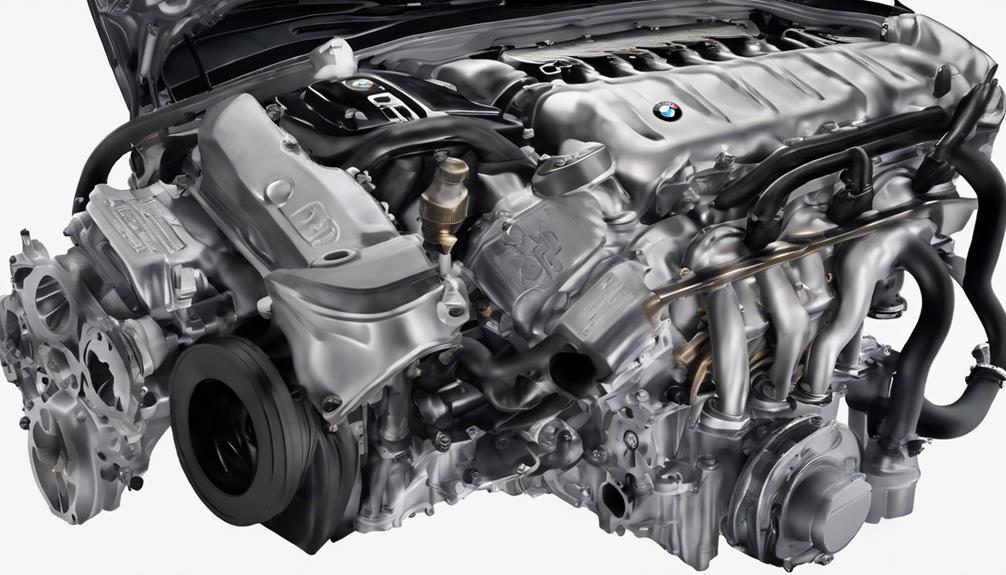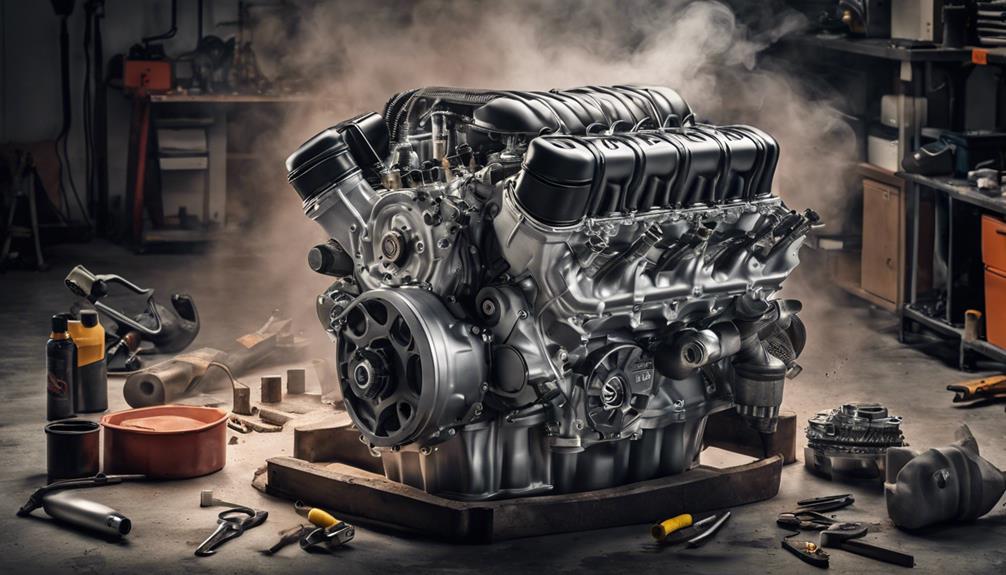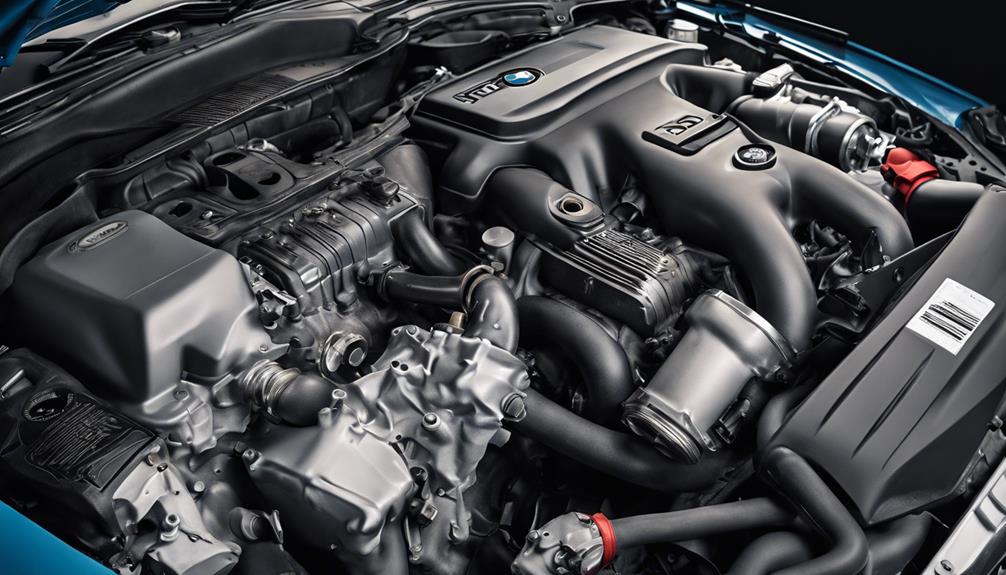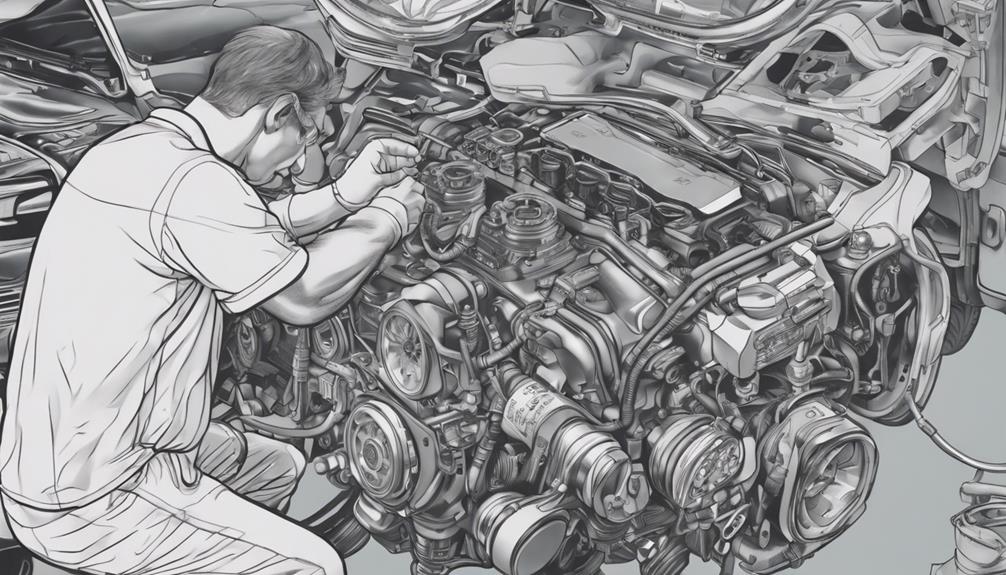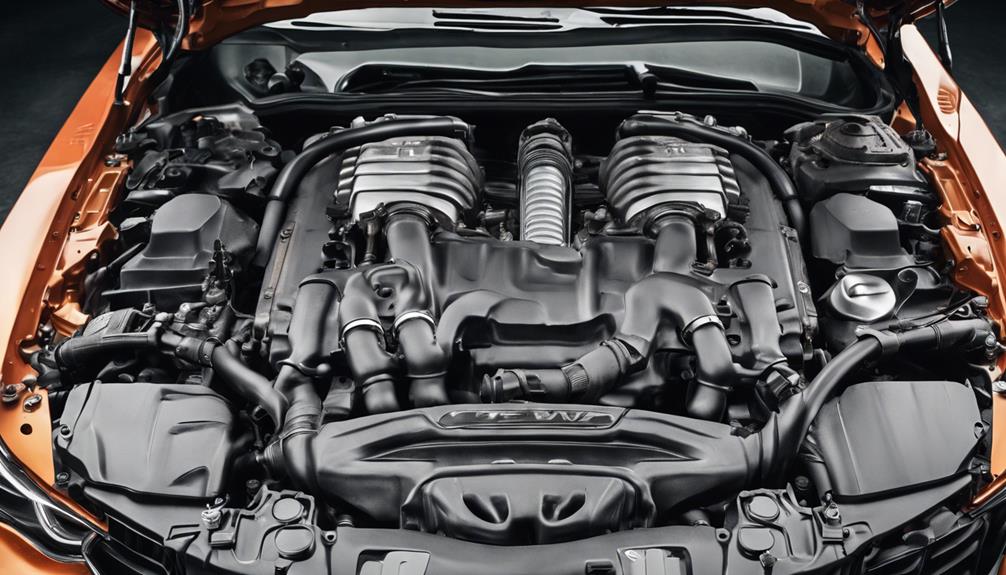Prepare to unearth the rollercoaster of issues with BMW N63 engines. From fuel pump hurdles causing stalling and rough idle to valve stem seal leaks creating white smoke, these problems can hit hard without warning. Coolant leaks through water pumps and hoses, timing chain miseries, and carbon buildup nightmares can all wreak havoc on your driving joy. Guarantee your engine stays in top shape by addressing these problems promptly to prevent costly repairs and maintain your BMW's peak performance.
Key Takeaways
- Fuel pump issues: stalling, rough idle, decreased fuel efficiency.
- Valve stem seal leaks cause white smoke and decreased performance.
- Coolant leaks: water pump and hoses common culprits, prompt repairs crucial.
- Timing chain failures lead to rough running and misfires.
- Carbon buildup harms valve function, regular cleaning essential for peak performance.
Fuel Pump Issues
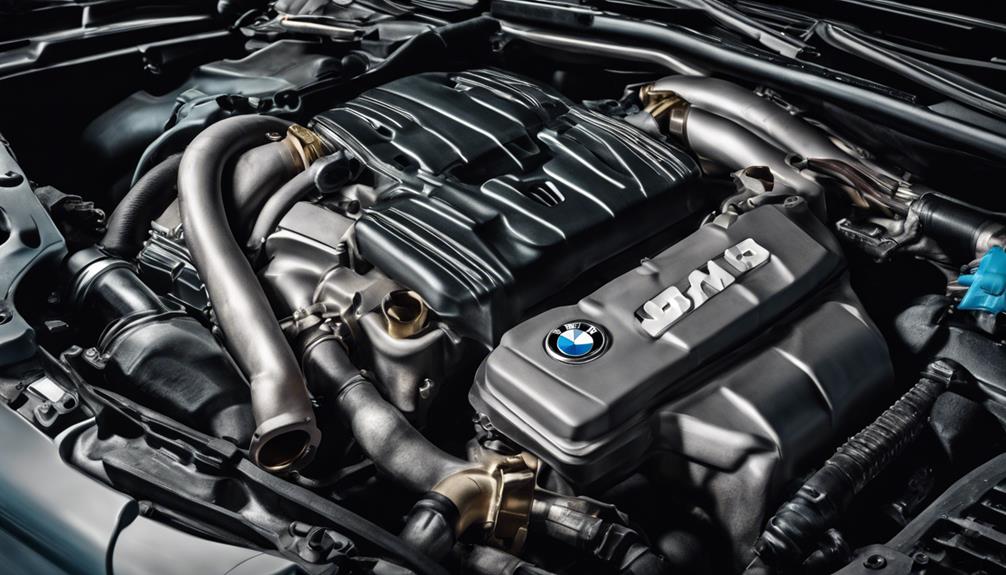
Experiencing fuel pump issues in your BMW N63 engine can lead to frustrating symptoms like stalling, rough idle, and decreased fuel efficiency. These symptoms often indicate high-pressure fuel pump (HPFP) failures, a common problem with N63 engines. When your HPFP malfunctions, it can result in insufficient fuel pressure reaching the engine, ultimately impacting its performance. Your engine might struggle to maintain a steady idle, might stall unexpectedly, or could guzzle more fuel than usual.
Addressing HPFP issues promptly is vital to prevent further damage to your engine. Ignoring these signs could lead to more severe complications down the road, potentially resulting in costly repairs. By prioritizing the repair or replacement of a faulty HPFP, you can guarantee that your BMW N63 engine continues to run smoothly and efficiently. Remember, staying on top of maintenance and promptly addressing any issues will help preserve the health and longevity of your beloved BMW.
Valve Stem Seal Leaks
When dealing with valve stem seal leaks in BMW N63 engines, the worn seals can allow oil to seep into the combustion chamber, causing detrimental effects on engine performance.
The hot-V layout of the BMW N63 engine exacerbates this issue, leading to increased oil consumption and potential engine complications.
Symptoms of leaking valve stem seals, such as white smoke from the exhaust and decreased engine performance, shouldn't be ignored.
Promptly addressing these leaks is essential to prevent further damage and maintain peak engine function.
Repairing leaking valve stem seals on a BMW N63 engine can be quite costly, ranging from $5,000 to $9,000 depending on the severity of the damage.
Staying vigilant and proactive in addressing any signs of valve stem seal leaks is important to avoid not only expensive repair costs but also to sustain the longevity of your BMW N63 engine.
Coolant Leak Problems
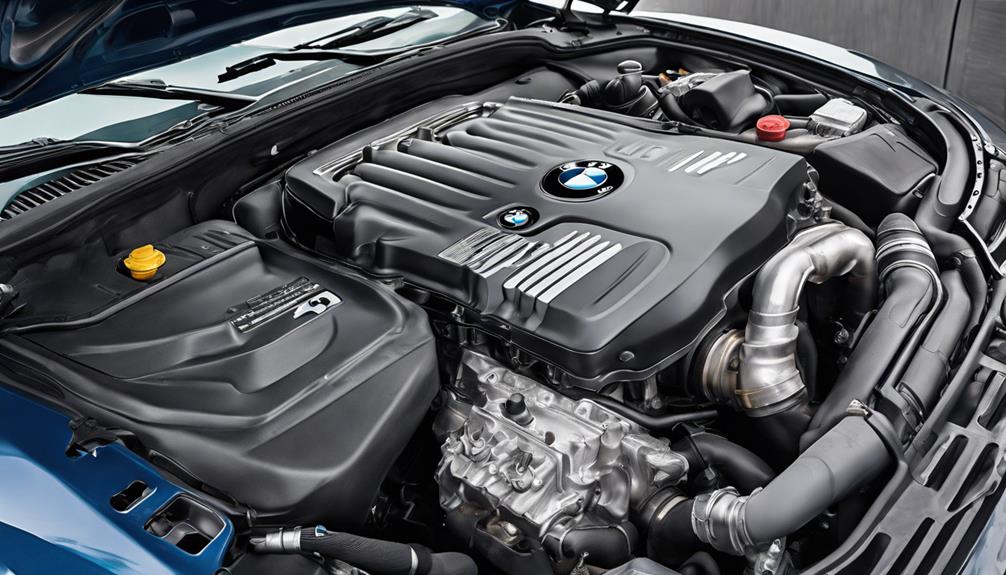
If you've noticed coolant puddles under your BMW N63 engine, chances are you're facing coolant leak problems stemming from issues with the water pump or coolant hoses. Here's what you need to know:
- Water Pump: The water pump in BMW N63 engines is a common culprit for coolant leaks. A malfunctioning water pump can lead to coolant seepage and eventually puddles forming under your vehicle.
- Coolant Hoses: Over time, the coolant hoses in your BMW N63 engine can deteriorate, crack, or develop leaks. Inspecting these hoses regularly can help identify and address any issues promptly.
- Engine Damage: Ignoring coolant leaks can result in serious engine damage. Low coolant levels can lead to overheating, which may cause irreversible harm to essential engine components.
- Maintenance: Regular coolant system inspections and maintenance are critical for preventing coolant leak problems. Timely intervention can save you from expensive repairs down the road.
- Prompt Action: Addressing coolant leak issues as soon as they arise is essential. Quick repairs can prevent further damage and keep your BMW N63 engine running smoothly.
Timing Chain Failures
In BMW N63 engines, timing chain failures can manifest as rough running, misfires, and a check engine light warning, indicating potential issues with engine performance. Worn timing chains not only disrupt engine operation but can also escalate into more severe engine problems if left unattended.
When facing symptoms of timing chain wear, it's important to have a service center evaluation to diagnose and address the issue promptly. Early detection and timely repair of timing chain problems are key in preventing costly engine repairs in BMW N63 models.
Carbon Buildup Concerns
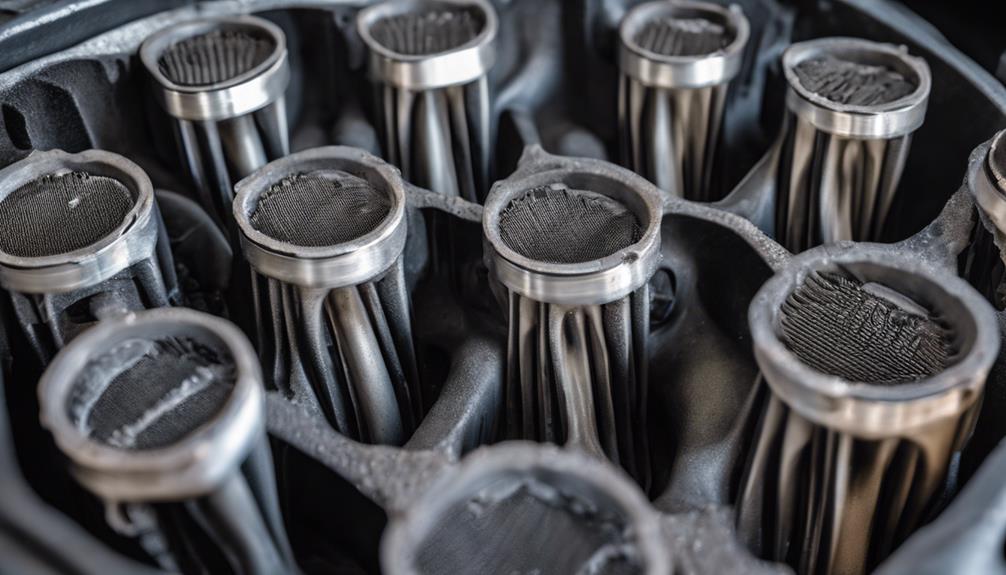
You've heard of carbon buildup, but did you know how it impacts your BMW N63 engine?
The direct injection design is a culprit, leading to carbon deposits on intake valves that can mess with their function.
Regular walnut blasting every 60,000 miles is the go-to solution for keeping your engine humming smoothly.
Carbon Deposits Impact
When considering the impact of carbon deposits on BMW N63 engines, one can't overlook the harmful effects they have on valve function and overall engine performance.
- Carbon buildup on intake valves from direct injection
- Impaired valve function leading to misfires
- Rough engine performance due to carbon deposits
- Recommended walnut blasting every 60,000 miles
- Common issue in N63 engines caused by fuel injection design
Addressing carbon buildup is essential to maintain the peak performance of your engine and prevent potential issues down the road. Keeping an eye on these carbon deposit concerns will help you guarantee your BMW N63 engine runs smoothly and efficiently.
Cleaning Methods Recommended
To effectively combat carbon buildup in BMW N63 engines, employing specialized cleaning methods is essential for maintaining top performance and preventing potential issues. Carbon deposits resulting from direct injection can have a major impact on valve function, leading to issues like misfires and decreased engine efficiency.
Regular walnut blasting every 60,000 miles is vital to effectively remove carbon buildup on valves and guarantee peak engine performance. By addressing carbon buildup promptly, you can prevent rough engine performance and potential power output reductions.
Keeping your engine free from carbon deposits not only improves overall efficiency but also enhances the longevity and reliability of your BMW N63 engine. Prioritizing proper cleaning methods will help you enjoy a smoother driving experience and avoid costly repairs.
Engine Performance Degradation
Experiencing engine performance degradation in BMW N63 engines can often be attributed to various underlying issues, ranging from carbon buildup on intake valves to timing chain irregularities. When faced with such concerns, exploring specific areas that could be impacting your engine's performance is crucial:
- Carbon Buildup: Accumulation on intake valves can hinder airflow and fuel mixture, leading to reduced power output.
- Valve Stem Seals: Worn seals may cause oil leaks into the combustion chamber, affecting combustion efficiency.
- Fuel Injector Failures: Malfunctioning injectors can disrupt fuel atomization, impacting combustion and overall engine performance.
- Timing Chain Issues: Stretching or misalignment can throw off engine timing, resulting in rough running and potential misfires.
- High-Pressure Fuel Pumps: Faulty pumps may lead to inadequate fuel pressure, affecting both engine performance and fuel economy.
Frequently Asked Questions
Is the BMW N63 Engine Reliable?
Yes, the BMW N63 engine can be reliable with proper care. Regular maintenance and attentive driving habits are key. Stay on top of servicing to enjoy your BMW N63 engine for miles to come.
What Year Did BMW Fix the N63 Engine?
In 2016, BMW addressed major reliability issues with the N63 engine, providing significant improvements. Opt for a 2016 model or newer to enjoy a more trouble-free driving experience with reduced chances of common problems.
What Is the Recall on the BMW N63 Engine?
If you're interested in the recall on BMW N63 engines, it's important to stay informed. Verify your vehicle's eligibility for the customer care package to address common issues like fuel injector failure, timing chain problems, and more.
How Much Does It Cost to Replace a N63 Engine?
Replacing an N63 engine typically costs between $12,000 to $20,000, varying based on model year, labor rates, and parts needed. Consider options like rebuilt engines for savings. Get multiple quotes to compare wisely.
Conclusion
Overall, owning a BMW N63 engine comes with its fair share of challenges. From fuel pump issues to timing chain failures, these engines require regular maintenance and care to prevent costly repairs down the road.
Keep an eye out for common problems such as valve stem seal leaks and coolant leaks, and be proactive in addressing them to guarantee peak performance and longevity for your BMW N63 engine.





